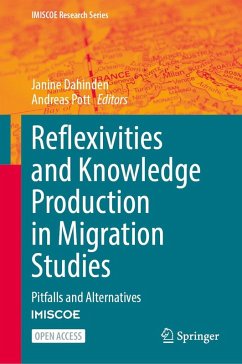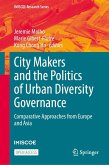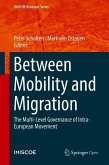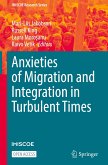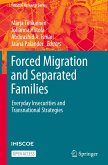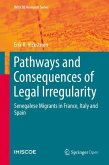Reflexivities and Knowledge Production in Migration Studies
Pitfalls and Alternatives
Herausgegeben:Dahinden, Janine; Pott, Andreas
Reflexivities and Knowledge Production in Migration Studies
Pitfalls and Alternatives
Herausgegeben:Dahinden, Janine; Pott, Andreas
- Gebundenes Buch
- Merkliste
- Auf die Merkliste
- Bewerten Bewerten
- Teilen
- Produkt teilen
- Produkterinnerung
- Produkterinnerung
This open access book brings together cutting-edge work on reflexive approaches within migration studies and emphasizes the boundedness and political character of knowledge production. Beyond presenting a state-of-the-art of the problematic aspects of knowledge production in migration studies, this volume is innovative insofar as the contributions all formulate alternatives. They should lead to transform knowledge production in relation to migration and therefore contribute to alter our ways to do research and tackle established power relations. By discussing a diverse range of topical…mehr
Andere Kunden interessierten sich auch für
![Refugee Protection Crises and Transit Europe Refugee Protection Crises and Transit Europe]() Julija SardelicRefugee Protection Crises and Transit Europe39,99 €
Julija SardelicRefugee Protection Crises and Transit Europe39,99 €![City Makers and the Politics of Urban Diversity Governance City Makers and the Politics of Urban Diversity Governance]() City Makers and the Politics of Urban Diversity Governance39,99 €
City Makers and the Politics of Urban Diversity Governance39,99 €![Merchants of Migrant Domestic Labour Merchants of Migrant Domestic Labour]() Liberty L. CheeMerchants of Migrant Domestic Labour39,99 €
Liberty L. CheeMerchants of Migrant Domestic Labour39,99 €![Between Mobility and Migration Between Mobility and Migration]() Between Mobility and Migration38,99 €
Between Mobility and Migration38,99 €![Anxieties of Migration and Integration in Turbulent Times Anxieties of Migration and Integration in Turbulent Times]() Anxieties of Migration and Integration in Turbulent Times38,99 €
Anxieties of Migration and Integration in Turbulent Times38,99 €![Forced Migration and Separated Families Forced Migration and Separated Families]() Forced Migration and Separated Families38,99 €
Forced Migration and Separated Families38,99 €![Pathways and Consequences of Legal Irregularity Pathways and Consequences of Legal Irregularity]() Erik R. VickstromPathways and Consequences of Legal Irregularity38,99 €
Erik R. VickstromPathways and Consequences of Legal Irregularity38,99 €-
-
-
This open access book brings together cutting-edge work on reflexive approaches within migration studies and emphasizes the boundedness and political character of knowledge production. Beyond presenting a state-of-the-art of the problematic aspects of knowledge production in migration studies, this volume is innovative insofar as the contributions all formulate alternatives. They should lead to transform knowledge production in relation to migration and therefore contribute to alter our ways to do research and tackle established power relations. By discussing a diverse range of topical subjects among others, epistemology, power, ethnocentrism, racism, decoloniality, gender and methodology this volume is a great resource to students, to junior and senior academics in migration studies and social sciences more general as well as to policy-makers in European countries.
Produktdetails
- Produktdetails
- IMISCOE Research Series
- Verlag: IMISCOE / Springer / Springer Nature Switzerland / Springer, Berlin
- Artikelnr. des Verlages: 89233133, 978-3-032-03336-9
- Seitenzahl: 352
- Erscheinungstermin: Oktober 2025
- Englisch
- Abmessung: 241mm x 160mm x 25mm
- Gewicht: 637g
- ISBN-13: 9783032033369
- ISBN-10: 3032033365
- Artikelnr.: 74929984
- Herstellerkennzeichnung
- Springer-Verlag GmbH
- Tiergartenstr. 17
- 69121 Heidelberg
- ProductSafety@springernature.com
- IMISCOE Research Series
- Verlag: IMISCOE / Springer / Springer Nature Switzerland / Springer, Berlin
- Artikelnr. des Verlages: 89233133, 978-3-032-03336-9
- Seitenzahl: 352
- Erscheinungstermin: Oktober 2025
- Englisch
- Abmessung: 241mm x 160mm x 25mm
- Gewicht: 637g
- ISBN-13: 9783032033369
- ISBN-10: 3032033365
- Artikelnr.: 74929984
- Herstellerkennzeichnung
- Springer-Verlag GmbH
- Tiergartenstr. 17
- 69121 Heidelberg
- ProductSafety@springernature.com
Janine Dahinden is Professor of transnational Studies at the University of Neuchâtel and research director of the NCCR on the move, Switzerland. She is also the co-director of the IMISCOE Standing Committee on Reflexivities in Migration Studies. Her research contributes mainly to three domains: Reflexivities and knowledge production in migration studies, the social organization of 'difference' and mobility studies. In particular, her research is anchored in what has been called reflexive migration studies: she aims at developing theoretical and methodological approaches which can overcome the nation-state- and ethnicity-centred epistemology that still largely informs migration studies and that not only creates particular forms of exclusions but also runs the risk to reproduce hegemonic structures. She proposed a few years ago to 'de-migranticize' research on migration and integration as one possible way to tackle such problems. Meanwhile she became more generally interested in the pattern how knowledge is produced within migration studies and the ethical, political and epistemological consequences that go with it. Andreas Pott is Professor of Social Geography at Osnabrück University, Germany. He is chair of the Collaborative Research Centre Production of Migration (SFB 1604), funded by the German Research Foundation (DFG) since 2024. He serves as deputy director of the interdisciplinary Institute for Migration Research and Intercultural Studies (IMIS) and co-director of the IMISCOE Standing Committee on Reflexivities in Migration Studies. His academic work is dedicated to the study of geographies of migration and to the development of a reflexive theory of the societal production of migration.
Chapter 1. Why We (Still) Need to Think and Write About Reflexivities in Migration Studies.- Part I: Epistemology and Producing Knowledge.- Chapter 2. Writing Migrants. Or What I Learnt About the Racialised Production of Scientificity While Crossing the Boundary Between Researched Migrant and Migration Researcher.- Chapter 3. Unsettling Normalisation Through Strong Reflexivity: Engaged Scholarship s Co-Creating Practices Toward Refugees Inclusion in the Netherlands.- Chapter 4. Practicing Double Reflexivity. Producing Knowledge on the Production of Knowledge on Migration.- Chapter 5. The Crisis of Representation and the Reflexive Turn in Migration Studies.- Part II: Knowledge Production and Power.- Chapter 6. Decolonising This, Decolonising That: Beyond Rhetorical Decolonisation in Migration Studies.- Chapter 7. Unequal Knowledge Production and Circulation in Migration Studies: Feminist Perspectives.- Chapter 8. Linguistic Hegemony, Marginalization, and Migration Scholarship. A View from the Francophone World.- Chapter 9. Racism in/through Migration Studies.- Part III: Concepts and Categorisations.- Chapter 10. What Comes After Post-Migration ? On the Biographies of Terms.- Chapter 11. A Reflexive Turn in Integration and Assimilation Studies. The Importance of the Power of White People Without a Migration Background.- Chapter 12. Experimenting with Analytical Categories as Reflexive Method: Mobility Trajectories to Study Young People with and without Migration Background.- Chapter 13. The Violence in and the Violence of Gendered Representations of Migrant Others.- Chapter 14. Mixed Migration-Mobility Couples: Disrupting the Age-Old Marriage Between Migration and Culture.- Chapter 15. Kinship Theory and Migration Studies: Challenging Ethnocentrism, Normativity, and State-Centered Epistemologies.- Part IV: Reflecting Reflexivities.- Chapter 16. Rethinking Reflexivities in Migration Studies. A Conversation.- Chapter 17. Shake It, Stretch It, Share It! Moving Reflexivities Beyond Migration.
Chapter 1. Why We (Still) Need to Think and Write About Reflexivities in Migration Studies.- Part I: Epistemology and Producing Knowledge.- Chapter 2. Writing Migrants. Or What I Learnt About the Racialised Production of Scientificity While Crossing the Boundary Between Researched Migrant and Migration Researcher.- Chapter 3. Unsettling Normalisation Through Strong Reflexivity: Engaged Scholarship s Co-Creating Practices Toward Refugees Inclusion in the Netherlands.- Chapter 4. Practicing Double Reflexivity. Producing Knowledge on the Production of Knowledge on Migration.- Chapter 5. The Crisis of Representation and the Reflexive Turn in Migration Studies.- Part II: Knowledge Production and Power.- Chapter 6. Decolonising This, Decolonising That: Beyond Rhetorical Decolonisation in Migration Studies.- Chapter 7. Unequal Knowledge Production and Circulation in Migration Studies: Feminist Perspectives.- Chapter 8. Linguistic Hegemony, Marginalization, and Migration Scholarship. A View from the Francophone World.- Chapter 9. Racism in/through Migration Studies.- Part III: Concepts and Categorisations.- Chapter 10. What Comes After Post-Migration ? On the Biographies of Terms.- Chapter 11. A Reflexive Turn in Integration and Assimilation Studies. The Importance of the Power of White People Without a Migration Background.- Chapter 12. Experimenting with Analytical Categories as Reflexive Method: Mobility Trajectories to Study Young People with and without Migration Background.- Chapter 13. The Violence in and the Violence of Gendered Representations of Migrant Others.- Chapter 14. Mixed Migration-Mobility Couples: Disrupting the Age-Old Marriage Between Migration and Culture.- Chapter 15. Kinship Theory and Migration Studies: Challenging Ethnocentrism, Normativity, and State-Centered Epistemologies.- Part IV: Reflecting Reflexivities.- Chapter 16. Rethinking Reflexivities in Migration Studies. A Conversation.- Chapter 17. Shake It, Stretch It, Share It! Moving Reflexivities Beyond Migration.

